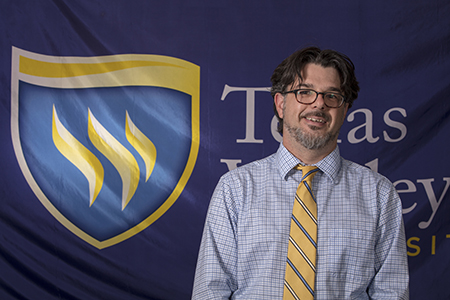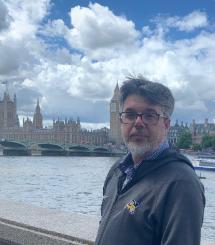
Alistair Maeer
 In His Own Words
In His Own Words
I grew up in Broken Arrow, Oklahoma after having emigrated from England when I was five years old. I have taught at a Montessori inspired Middle School in Dallas, as well as at universities in Kentucky and Oklahoma. Nowadays, I found myself living in Fort Worth with my wife, Jessica, son, Ari, and daughter, Isabella. Whenever there is wind and time, I can be found sailing on nearby Eagle Mountain Lake. In addition, between watching the British Premier League as an avid supporter of Liverpool Football Club and sailing, I try to renew my love of travel and eating new foods.
In each of the courses that I teach, I stress the importance of events and their consequences in a concrete and abstract manner. I hope to compel students to confront differing and competing stories (voices) of the past discretely and as ongoing reflections of the present as well. In effect, I regularly reiterate a simple, yet thought-provoking concept: “History is the story we tell ourselves, about ourselves, and we want to hear.” While lecturing, I try to be as evocative as possible to help jar students from myopic interpretations. I constantly try to convey dynamic forces at play, rather than flat, even stagnant, explanations of events. Yet, what I enjoy most is explaining how the layers of the past still inform us today, often in the disguise of outdated intellectual constructs. My goal, at the end of the day, is to challenge my students to appreciate new ideas, new modalities, and to contribute to the class’s understanding of the past and the world of ideas. Moreover, I hope that my students are able to recognize the significance of the past beyond the classroom and apply it to their own understanding of their communities. In the end, and above all else, I believe that it is my passion for teaching history that my students appreciate most alongside my ready willingness and accessibility to help them master their studies. I am committed to serving a rich variety of students—including many students who might not be “committed” to history but rather to various other fields such as business and chemistry.
I am passionately dedicated to helping students understand the broader connections and relationships that have defined history since the ‘Age of Exploration and Discovery.’ In my survey courses, I lecture and set aside class time every day for discussions of past and present events—effectively showing students how and why history is relevant to them today. I conduct my advanced classes as seminars. My overriding concern as a teacher is to encourage my students to take an active role in learning. Creative presentation and structure are crucial to this process. I blend social, political, intellectual and cultural histories to emphasize the multitude of perspectives and experiences that exist in any society. Ultimately, I see the teaching experience as an open dialogue in which free discussions give everyone involved a new perspective on the subject.
Education
- Ph.D. Trans-Atlantic History, the University of Texas at Arlington
- M.A. European History, University of Toronto
- B.A. History (Honors), William Jewell College
Research Interests
I focus on themes that connect peoples and places across the Atlantic, highlighting the shared histories of the Americas, Africa, and Europe; specifically, how historical cartography & imagery—via its ‘real’ connection to the events of the past and its interpretative value—can be used to illuminate and better understand historical attitudes and realities since the Middle Ages.
I am currently researching and writing a monograph about late 17th-century English overseas expansionism and empire thru the adventures of a common mariner, Edward Barlow. I have published articles on the evolution of maritime cartography in European history and presented various papers on such diverse topics as General Education, Native American education, English marine charting, and late 19th-century Anglo-American relations.







